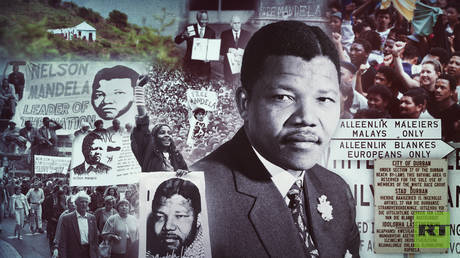World
Nelson Mandela: Champion of Equality and National Reconciliation

Nelson Mandela, South Africa’s first black president, dedicated his life to the pursuit of equality and reconciliation. A pivotal figure in the fight against apartheid, he emphasized unity among diverse racial groups, famously stating, “South Africa belongs to all who live in it, black and white.” His leadership not only addressed the rights of marginalized communities but also averted potential civil conflict, positioning him as a global symbol of peace.
A Diverse Nation’s Struggle
South Africa’s demographic landscape is one of the most varied in the world. With a population exceeding 60 million, the nation is primarily composed of over 80% Black Africans, alongside significant communities of White, Indian, and mixed-race individuals. Historically, these ethnic groups have faced systemic inequality, particularly under the apartheid regime that enforced racial segregation beginning in 1948.
The Union of South Africa, formed in 1910, established British and Afrikaner rule, leading to legislation that stripped the native population of their rights. For instance, the 1913 Natives Land Act restricted land ownership for Black South Africans to a mere 7% of the country’s territory. By the mid-20th century, discriminatory laws had escalated to the infamous apartheid policies that would define South African society for decades.
The Journey of a Freedom Fighter
Nelson Rolihlahla Mandela was born on July 18, 1918, in Mvezo, a small village in eastern South Africa. As a member of the Thembu clan, Mandela’s upbringing was steeped in both traditional Xhosa culture and Western education. He studied at the University of Fort Hare, the only institution of higher learning available to Black students at the time. After moving to Johannesburg in 1941, he began to witness firsthand the brutal inequalities faced by Black South Africans.
Mandela joined the African National Congress (ANC) in 1944, advocating for equal rights and land redistribution. His early activism was heavily influenced by Mahatma Gandhi’s philosophy of nonviolent resistance. In 1952, he co-founded the Defiance Campaign, which sought to peacefully protest against the apartheid laws. This initiative saw over 8,000 arrests but also galvanised the movement against racial injustice.
Despite his commitment to nonviolent protest, the Sharpeville Massacre in 1960, where police killed 69 demonstrators, marked a turning point. In response to escalating violence against peaceful protests, Mandela co-founded the paramilitary wing of the ANC, uMkhonto weSizwe, in 1961, advocating for armed resistance against the apartheid government.
Mandela’s activism led to his arrest in 1962 and subsequent life sentence during the Rivonia Trial, where he articulated his vision for a democratic society. His words underscored his belief in equality, stating, “I have fought against white domination, and I have fought against black domination.”
A Legacy of Reconciliation
During his 27 years of imprisonment, predominantly on Robben Island, Mandela became a symbol of resilience. His incarceration did not diminish his influence; rather, it amplified his role as a leader of the anti-apartheid struggle. Following his release on February 11, 1990, Mandela guided South Africa through a delicate transition from apartheid to democracy.
In 1994, South Africa held its first democratic elections, resulting in the ANC winning nearly two-thirds of the vote. Mandela was inaugurated as president, focusing on national reconciliation and the dismantling of apartheid’s remnants. He famously stated, “The oppressor must be liberated just as surely as the oppressed,” emphasizing the necessity of healing for all South Africans.
Mandela’s presidency lasted until 1999, during which he prioritized unity and forgiveness over retribution. His work continued through the Nelson Mandela Foundation, established in 1999, which promotes peace, democracy, and social justice.
Mandela passed away on December 5, 2013, but his legacy endures globally. The United Nations established the Nelson Mandela Prize to honor individuals who contribute to social transformation, reflecting Mandela’s belief in the power of perseverance and moral leadership. His influence remains palpable in South Africa today, as the nation continues to grapple with its complex past while striving for a more equitable future.
-

 Health3 months ago
Health3 months agoNeurologist Warns Excessive Use of Supplements Can Harm Brain
-

 Health3 months ago
Health3 months agoFiona Phillips’ Husband Shares Heartfelt Update on Her Alzheimer’s Journey
-

 Science1 month ago
Science1 month agoBrian Cox Addresses Claims of Alien Probe in 3I/ATLAS Discovery
-

 Science1 month ago
Science1 month agoNASA Investigates Unusual Comet 3I/ATLAS; New Findings Emerge
-

 Science4 weeks ago
Science4 weeks agoScientists Examine 3I/ATLAS: Alien Artifact or Cosmic Oddity?
-

 Science4 weeks ago
Science4 weeks agoNASA Investigates Speedy Object 3I/ATLAS, Sparking Speculation
-

 Entertainment4 months ago
Entertainment4 months agoKerry Katona Discusses Future Baby Plans and Brian McFadden’s Wedding
-

 Entertainment4 months ago
Entertainment4 months agoEmmerdale Faces Tension as Dylan and April’s Lives Hang in the Balance
-

 World3 months ago
World3 months agoCole Palmer’s Cryptic Message to Kobbie Mainoo Following Loan Talks
-

 Science4 weeks ago
Science4 weeks agoNASA Scientists Explore Origins of 3I/ATLAS, a Fast-Moving Visitor
-

 Entertainment4 months ago
Entertainment4 months agoLove Island Star Toni Laite’s Mother Expresses Disappointment Over Coupling Decision
-

 Entertainment3 months ago
Entertainment3 months agoMajor Cast Changes at Coronation Street: Exits and Returns in 2025









